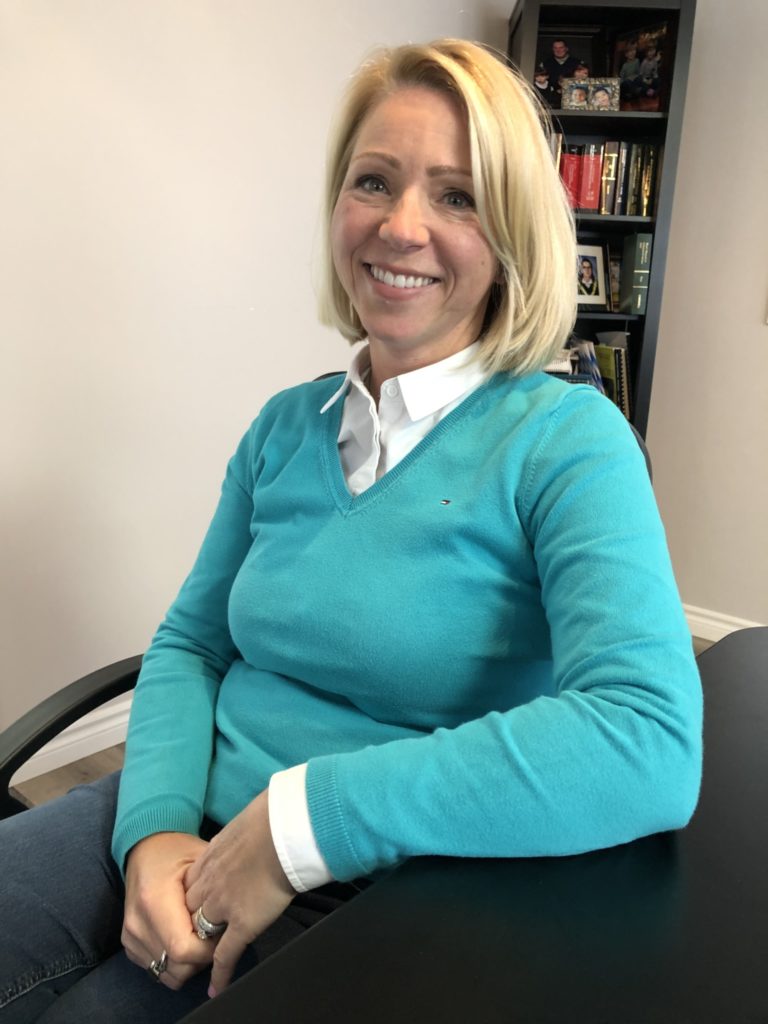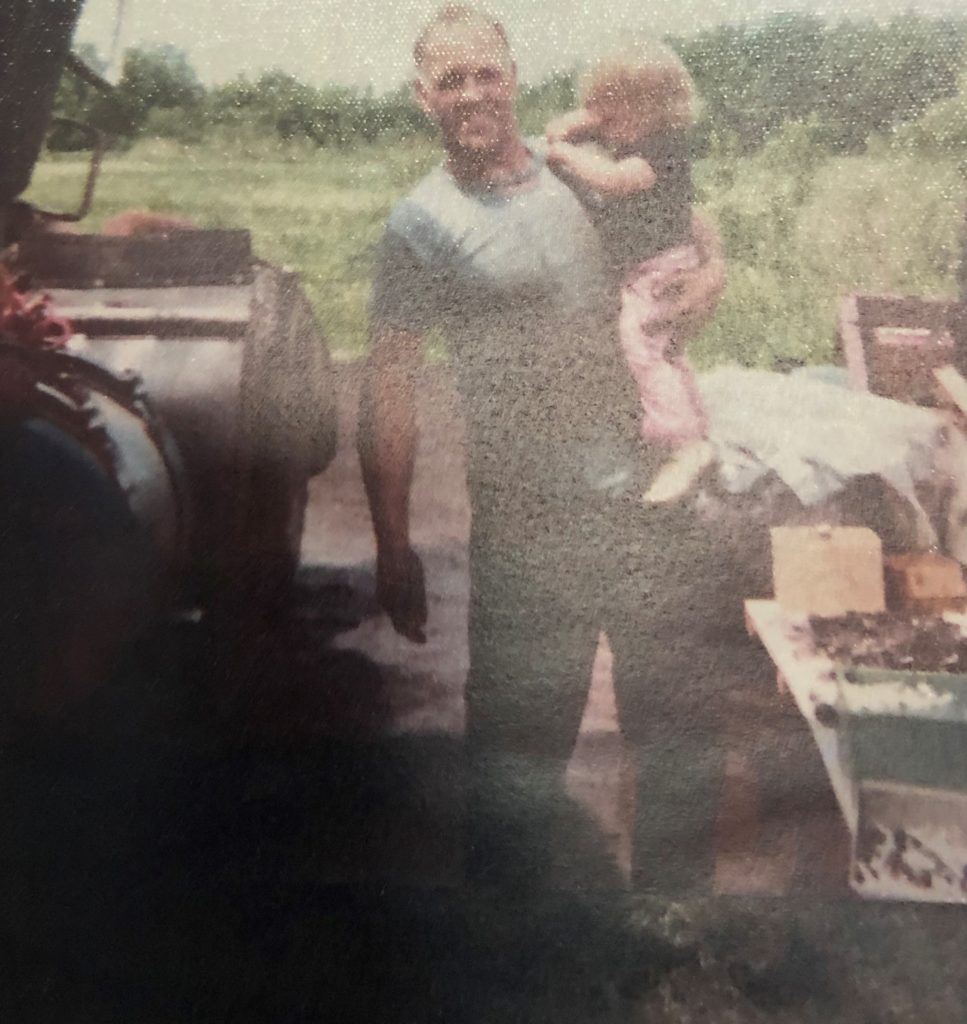Defending truckers comes naturally thanks to family roots
Those growing up in a trucking family often say they have diesel flowing in their veins. For Jodi Burness, the expression may be closer to reality than for others. While playing in the shop as a young girl as her father worked on his truck, she recalls taking a large swig from a Coke can she found on a workbench. She realized too late it contained diesel fuel.
That’s just one of many memories Burness has about a childhood surrounded by trucks, which would eventually lead her to becoming one of the Ontario trucking industry’s greatest advocates as founder and president of Burness Paralegal Services.

“I joke all the time I grew up inside a truck,” Burness told Today’s Trucking in an interview at her Thamesford, Ont., office. “We had a CB radio in our kitchen.”
Burness, Jodi Eschbach at the time, has deep trucking family roots. Her father Frank Eschbach drove truck for Better Beef between Montreal and Toronto and was a truck mechanic. Her aunt was one of a few female truck drivers at the time and her brother would go on to become a truck driver, which he still is today.
The family lived outside Montreal until 1996, when it pulled up stakes and moved to Ontario. Burness, trying to figure out what she wanted to do with her life, became familiar with the paralegal profession – one that doesn’t exist in Quebec – when she moved to Ontario and studied at Loyalist College in Belleville, Ont. She took a government job in Ottawa, where she met a paralegal she approached for a job.
“He did small claims work,” she recalled. “He said ‘I don’t need any help with small claims, but do you know anything about provincial offenses? And do you know anything about trucks?’ I said ‘That’s the magic word and what I don’t know, I have a fantastic resource.’”

Her first file in 1998 was a trial involving an out-of-adjustment brake charge. She visited her father and spent an entire day underneath a truck learning about air brake systems and components.
“This was a time when people didn’t go to trial,” she said. “The CVOR system was in its infancy and people didn’t get the concept of challenging charges.”
During the trial, Burness cross-examined the officer who brought the charge and ultimately won. She was hooked.
“That was it,” she said. “I said, ‘This is what I’m doing for the rest of my life.’”
The early days
Just 25 years old, Burness took her earnings and traveled Europe where she met her first husband. Upon returning, the couple opened a map of Ontario, closed their eyes, and planted a pin at random to determine where they’d settle. It landed on London, Ont., and so they packed up and moved there.
“Talk about fortuitous, that I moved to the transportation capital of Canada more or less,” she said. There, she took a job at a law firm to learn how to open and close files. She met Sandy Baigent and formed E&B Paralegal. Baigent left the company to pursue her interest in compliance, forming E&B Safety Consulting, and in 2007, Burness Paralegal Services was born.
Today, Burness has eight paralegals on staff and the firm focuses solely on the trucking industry, defending truckers against a full gamut of charges. Asked if she’s public enemy number one to the Ministry of Transportation of Ontario (MTO), Burness joked “I like to think I’m public enemy number one, because I would’ve earned that title. But in truth, I think they recognize I make them better at the same time they’re making me better. We are collectively improving the industry.”
Burness has seen the quality of charges improve over the years. “The MTO understands there is a level of professionalism they have to exercise.”
The types of charges Burness finds herself defending most vary, but some are omnipresent.
“Right now, it’s load security,” she explained. “Tomorrow, it’ll probably be brakes. In the spring we see a lot more mechanical charges and a lot of load security because officers want to stand up and examine what’s at eye level.”
“There is a presumption of innocence in this country. Right out of the gate it’s not your job to prove yourself innocent, it’s the Crown’s and government’s responsibility to prove you guilty – so let them do it. They want to lay the charge, let them earn it.”
Jodi Burness, Burness Paralegal Services
Brake issues, however, never go away. “Brakes are such a huge issue,” she said. “You’ve got to mark and measure (brake stroke) or rely on certifiable tattletales.”
Anyone charged with an offense they dispute should fight it right away, Burness advised.
“There is a presumption of innocence in this country. Right out of the gate it’s not your job to prove yourself innocent, it’s the Crown’s and government’s responsibility to prove you guilty – so let them do it. They want to lay the charge, let them earn it.”
Technology has rapidly changed the trucking industry and it has also affected how charges are brought and defended. Burness has a mixed view of new technologies.
“Dash cams – I don’t like’em,” she admitted. “I don’t like’em because I feel if evidence is going to exonerate you, I can get that from the driver and if it’s not going to be helpful, there isn’t much you can say about it. I get why insurance loves them. We know exactly what happened. I don’t really like them because enforcement is unclear about what the evidentiary rules are, you get officers seizing things they shouldn’t be, you get drivers offering up evidence before we even know what the evidence is. It’s a game-changer in the sense we always have to be aware there’s probably someone out there with a dash cam that has our client doing something or not doing something, and I don’t like it.”
The technological evolution
Burness said electronic logging devices (ELDs) have significantly reduced hours-of-service related charges. This could be due to greater compliance, but also enforcement’s discomfort with the new technologies and reluctance to lay charges without fully understanding their nuances, Burness pointed out.
Burness initially struggled with the arrival of electronic control modules (ECMs), as did the court system itself.
“The court system doesn’t like technology,” Burness said. “You still have people wanting to use a typewriter, they still wheel in DVD players and big, funny-looking tube TVs. Bringing that kind of (ECM-generated) evidence in is confusing for judges.”
Burness was instrumental in having the Ministry of Transportation eliminate the use of the Ez-Tap aftermarket device to enforce the province’s speed limiter legislation. She defended a U.S. fleet charged using the Ez-Tap, had a report written by an expert witness calling into question its reliability, and was prepared to go to trial when the MTO at the last minute dropped the charge and admitted it has stopped using the device. But her biggest win, since that one never went to trial, came in about 2012 when she defended a trucking company that was wrongly accused of causing a fatal collision.
The driver was charged with careless driving, among four other charges, and after two years a four-day trial commenced. The evidence exonerating the driver was so strong, the Justice of the Peace called the investigating officer who blamed the trucker a “liar.”
“That never happens. That was huge,” Burness recalled.
While the victories pile up and CVOR points against her clients melt away, Burness and her associates continue to pursue an education in trucking.
“Every year we pick a client that is willing and we and take a day out of their life and pepper them with questions,” she explained. “I recently invited myself to a client’s facility in Guelph and spent the entire day there exhausting their maintenance manager with nothing but questions. That’s one of the wonderful things about this industry; there’s always somebody there willing to help.”
Have your say
This is a moderated forum. Comments will no longer be published unless they are accompanied by a first and last name and a verifiable email address. (Today's Trucking will not publish or share the email address.) Profane language and content deemed to be libelous, racist, or threatening in nature will not be published under any circumstances.
If you are in trucking, write down Burness Paralegal and their phone number. Then never leave home without it!
Boy, I wish I’d known about Jody long ago. If you go to court to defend your rights, when the court finds out you’re a truck driver, here comes the public interest decision. “You are a professional” ( certainly can’t expect Goober to be responsible )
Might as well show up with my fly open. It’s called ‘Justice, the rule of law, or proven in court’ or such like.
Proven in court means stack the cards against you, force you to loose mega $s in lost revenue. Drop this charge if you plea guilty to this.
I used to carry a federal inspection book in the truck with me they don’t like it when u say show me in your book then I will look it up in mine to make them no the law as for load securement I took all my chains off the load and told the DOT man show me how to tie it down. because all of them work for u . u pay tax they work for a tax payer funned branch of the gov,t
Truckers are very important and need to be protected. They are what keeps people fed, buying goods and other. Without them people would fall apart.